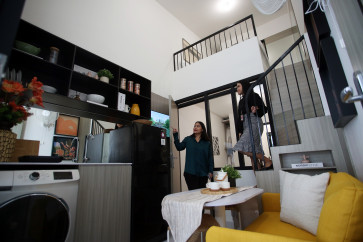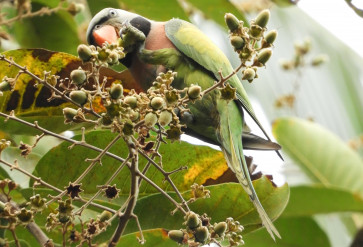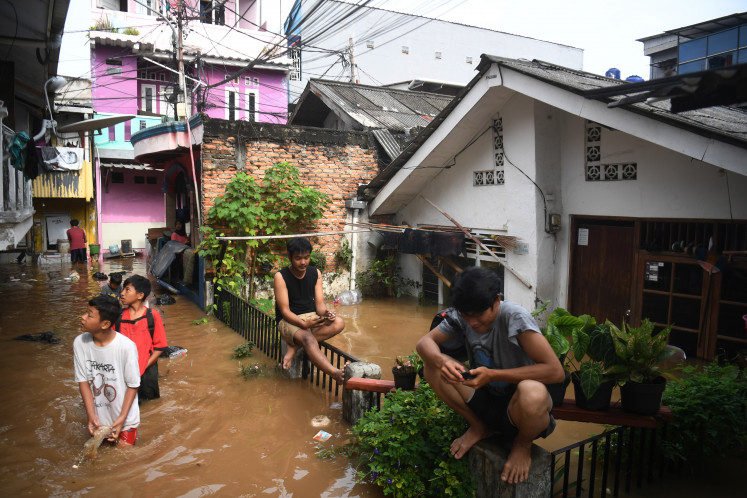Popular Reads
Top Results
Can't find what you're looking for?
View all search resultsPopular Reads
Top Results
Can't find what you're looking for?
View all search results69th Republic Day of India: Indians in Surabaya find new home in Indonesia
Sanyog Meenu Sanyam Sanket Srivastava (JP/Wahyoe Boediwardhana)Many Indian expatriates living in Surabaya, East Java, are easily adjusting to living in Indonesian society
Change text size
Gift Premium Articles
to Anyone

Sanyog Meenu Sanyam Sanket Srivastava (JP/Wahyoe Boediwardhana)
Many Indian expatriates living in Surabaya, East Java, are easily adjusting to living in Indonesian society. They are very happy about living in the country, as the cultural characteristics are not so different from those of India.
Sanyog Meenu Sanyam Sanket Srivastava, an Indian expatriate who lives in Surabaya, said the city was exactly like his hometown of Bhopal in Madhya Pradesh state. He has been living in Surabaya for 19 years with his wife and two children.
“I like staying in Indonesia, especially in Surabaya, which has an ambience that is not markedly different from my country of origin. For instance, Indonesia has a large proportion of Muslims and in India approximately 150 million people are also Muslim,” Sanyog told The Jakarta Post recently.
He said he was surprised to find himself familiar with Indonesian culture, considering that the first time he came to the country he knew very little about Indonesia, besides the fact that the country was home to Bali – an island that has become a wildly popular tourist destination.
Ashish Kumar Srivastava, an Indian expatriate who has been living in Surabaya for 12 years after arriving there from his hometown of Kanpur in the northern state of Uttar Pradesh, also expressed a similar sentiment to Sanyog, saying that he was deeply impressed with the local residents of Surabaya.
According to Ashish, the comfort of living with Surabayan people has led him to rethink whether he would return to India or settle in Surabaya instead.
“I really like Surabaya. I have visited 18 countries across the globe and this is my favorite city. The people are really friendly and helpful and they make me feel at home here,” Ashish said.
According to Sanyog, besides himself, around 100 families or 300 Indian expatriates live in Surabaya. He estimated that Indian expatriates who currently lived in the country had been settled there across two or three generations and most of them had chosen to become Indonesian citizens.
The Indians formed an amicable relationship with people who live in their neighborhoods, he said. He added that alternately, when the Indian community needed local people’s help in organizing social and cultural events, locals were always eager to help.
He mentioned a few restaurants that have gained popularity among Indian expatriates, such as Sitara India Cuisine located on Jl. Hayam Wuruk and Golden Saffron Restaurant located on Bukit Darmo Boulevard in the western part of Surabaya.
He added that Sitara India Cuisine was also the locals’ go-to place to discover detailed information on the what, when and where of upcoming Indian community social and cultural activities.
“An Indian expatriate who has just come to Surabaya for the first time will automatically look for an Indian restaurant to eat at. These restaurants have become a place where they network and introduce themselves to fellow Indian expatriates who also live in the city,” explained Sanyog, who served as the India Association Surabaya chairman from 2008 to 2016.
“The Indian community in Surabaya organizes gatherings and cultural activities every two or three months. The gatherings and activities take place at various venues like hotels, clubhouses and restaurants specializing in Indian cuisine,” Sanyog continued.
Ashish said the Indian community had received great help from Surabaya Mayor Tri Rismaharini in organizing Indian-Indonesian cultural exchange programs.
“We obviously can’t afford to rent venues to hold Indian cultural shows, be they film screenings or dance performances. Ibu Risma is of great help on this,” Ashish said.
He added that Indians also faced no obstacle in organizing big religious celebrations such as Deepavali and Holi, which usually involve around 100 people – who will invite locals to join them – gathering in a large space.
Other cultural exchange programs are organized by the India Association of Surabaya, often in cooperation with the Indian Embassy in Jakarta. One important event is the annual India Food Festival, which involves Indian expatriates hailing from the country’s northern, central and southern parts to introduce the culinary traditions from their respective areas to local visitors.
The food festival also involves Surabayans, who are encouraged to present their local cuisines.
Recently, Indians living in Surabaya received praise directly from the Indian External Affairs Minister Sushma Swaraj for their generous help to fellow Indians.
She thanked all members of the Indian community in Surabaya, who went beyond the call of duty and helped out fellow Indians who were stranded in Bali recently because of the eruption at Mount Agung.
She said the setting up of help-desks and provision of food and volunteers to the transiting Indians in Surabaya was deeply appreciated and very well received. She also said the spirit of an Indian helping out his fellow Indian in distress must be preserved and cherished, especially on foreign soil.









